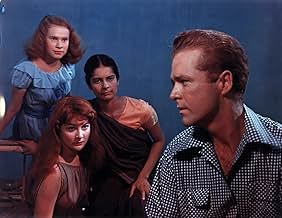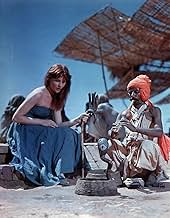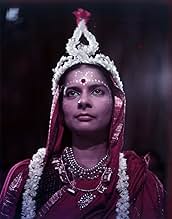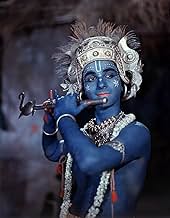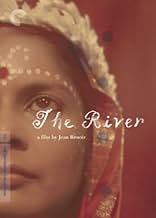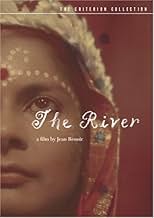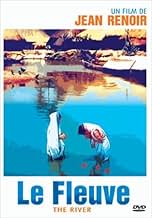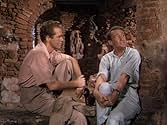IMDb RATING
7.4/10
7.2K
YOUR RATING
The growing pains of three young women contrast with the immutability of the holy Bengal River, around which their daily lives unfold.The growing pains of three young women contrast with the immutability of the holy Bengal River, around which their daily lives unfold.The growing pains of three young women contrast with the immutability of the holy Bengal River, around which their daily lives unfold.
- Nominated for 2 BAFTA Awards
- 3 wins & 4 nominations total
June Tripp
- Narrator
- (voice)
- (as June Hillman)
Nimai Barik
- Kanu
- (uncredited)
Richard R. Foster
- Bogey
- (uncredited)
Jane Harris
- Muffie
- (uncredited)
Jennifer Harris
- Mouse
- (uncredited)
Trilak Jetley
- Anil
- (uncredited)
Sajjan Singh
- Ram Singh - The Gateman
- (uncredited)
Penelope Wilkinson
- Elizabeth
- (uncredited)
Cecilia Wood
- Victoria
- (uncredited)
Featured reviews
10dfmlsf
There is something special about this movie. In fact, to say there is something special does not tell much, and it could be equally applied to hundreds of films which are much less special than this. So let's start again. I had never seen a film like "The River" before. Thanks to the Spanish TV program "Qué grande es el cine" I discovered this piece of Art created by a major artist: Renoir. Some of my other favourite movies are similar in some aspects to others. And so, "North by Northwest" resembles other thrillers with Cary Grant; "A Touch of Evil" is a moral fable and also a nightmare which reminds a bit of "The Night of the Hunter", and so on. But "The River" reminds me of nothing I have seen on a screen. It has to do with ethics and with life. It has to do with balance, with understanding human nature. I think this film has everything which can be told in a film. Absolutely everything. I believe this film reflects an attitude towards life and towards art. So I got it finally! This film is if anything an attitude. Once you have seen, you feel better, you know more about life, your perspective has changed. It is a ray of light. I should be compulsory in High School and everywhere.
Unlike many western movies i have seen that portrays Indians as if they were some nomadic people who are far from culture and sophistication, this film understands and illustrates the exact philosophy behind every deed that is performed by the Indians.
And also i wonder why can't so many great directors inspire from a film like this to understand that the true culture lies in philosophy and not in their race or color. I suppose it is easy to stick to stereotypes rather than educating through movies.
Therefore, it is not diversity for namesake that is important, but proper the depiction of one's understanding towards the diversity.
And also i wonder why can't so many great directors inspire from a film like this to understand that the true culture lies in philosophy and not in their race or color. I suppose it is easy to stick to stereotypes rather than educating through movies.
Therefore, it is not diversity for namesake that is important, but proper the depiction of one's understanding towards the diversity.
Jean Renoir embraces Technicolor for the first time in his adaptation of Rumer Godden's coming- of-age novel THE RIVER, with the latter collaborating on the screenplay. The story takes place in Bengal, India, a teenage girl named Harriet (Walters) is the eldest child of a middle-class British family living near the riverbank of Ganges, her father (an one-eyed Knight) runs a jute mill, and her mother (Swinburne) is expecting a child no. 7.
It is a carefree scenario, growing up in the natural inculcation of an exotically profound Hindu culture while carrying on an genteel upbringing, sometimes, it conspires to be a false or at least parochial impression of the land and its people, which doesn't take up too much space in the story-line, the only native Indian who has a speaking part is Nan (Mukerjee), the family's convivial but gossipy nanny, and the rest sustains as an ethnic curiosity to meet the Westerners' eyes, although beguilingly and entrancingly so, after all, what we are allowed to watch is the smugly colonial tip of the Indian iceberg.
The plot revolves around Harriet's budding affection towards the guest of their neighbor Mr. John (Shields), an one-legged American Captain John (Breen), who takes his time in lolling on a foreign land, to find some peace with his battlefield past and physical disability, look for a new resolution for life. As John is the only eligible white young man on the market, to her chagrin, a besotted, but fairly plain-looking Harriet has a losing game against her rival, the maturer and more zaftig Valerie (Corri), by the way, a British girl too is also her best friend. And throughout this picturesque film, it is Harriet's voice-over that guides viewers traversing her prepubescent triviality (poems, indeed), to listen to her inner voice, to sympathize her unrequited love, to find empathy in this garden-variety tale.
Wielded as an emotional clincher, a tragic incident materializes as one downside of having a brood of many caused by adult negligence, but here also emanates a disquieting undertow to pinpoint the virulence of a foreign society with a local boy standing by as an unwary abetter. And a cheesy solution to get it over is taking the pro-procreation flag, babies are being borne all the time.
The cast is mixed with adult professionals and amateur players, but comes off barely adequate, a major gripe is the narrative ellipsis in the story of Melanie (Radha), the mixed-race daughter of Mr. John, who stands out (there is not much competition though) with a massively pleasurable Ganesha-courting dancing sequence, but whose dislike of herself, waffling identity never been considerably mapped out as a pre-eminent counterpoint of Harriet's more orthodox background.
So, all above sounds like a pejorative critique against a film who has earned a hallowed reputation since its genesis, yet, it is as plain as the nose on one's face, the picture's eye-catching glamour and aural accompaniments are undeniably supreme, technologically speaking. And it is smart enough for Mr. Renoir to treat it as a philosophical prose other than a heady narration of banal proceedings, only a 60-odd-year later, its allure fades away slightly due to the original novel's awkward stance on a colonized land and Renoir's condoning deference.
It is a carefree scenario, growing up in the natural inculcation of an exotically profound Hindu culture while carrying on an genteel upbringing, sometimes, it conspires to be a false or at least parochial impression of the land and its people, which doesn't take up too much space in the story-line, the only native Indian who has a speaking part is Nan (Mukerjee), the family's convivial but gossipy nanny, and the rest sustains as an ethnic curiosity to meet the Westerners' eyes, although beguilingly and entrancingly so, after all, what we are allowed to watch is the smugly colonial tip of the Indian iceberg.
The plot revolves around Harriet's budding affection towards the guest of their neighbor Mr. John (Shields), an one-legged American Captain John (Breen), who takes his time in lolling on a foreign land, to find some peace with his battlefield past and physical disability, look for a new resolution for life. As John is the only eligible white young man on the market, to her chagrin, a besotted, but fairly plain-looking Harriet has a losing game against her rival, the maturer and more zaftig Valerie (Corri), by the way, a British girl too is also her best friend. And throughout this picturesque film, it is Harriet's voice-over that guides viewers traversing her prepubescent triviality (poems, indeed), to listen to her inner voice, to sympathize her unrequited love, to find empathy in this garden-variety tale.
Wielded as an emotional clincher, a tragic incident materializes as one downside of having a brood of many caused by adult negligence, but here also emanates a disquieting undertow to pinpoint the virulence of a foreign society with a local boy standing by as an unwary abetter. And a cheesy solution to get it over is taking the pro-procreation flag, babies are being borne all the time.
The cast is mixed with adult professionals and amateur players, but comes off barely adequate, a major gripe is the narrative ellipsis in the story of Melanie (Radha), the mixed-race daughter of Mr. John, who stands out (there is not much competition though) with a massively pleasurable Ganesha-courting dancing sequence, but whose dislike of herself, waffling identity never been considerably mapped out as a pre-eminent counterpoint of Harriet's more orthodox background.
So, all above sounds like a pejorative critique against a film who has earned a hallowed reputation since its genesis, yet, it is as plain as the nose on one's face, the picture's eye-catching glamour and aural accompaniments are undeniably supreme, technologically speaking. And it is smart enough for Mr. Renoir to treat it as a philosophical prose other than a heady narration of banal proceedings, only a 60-odd-year later, its allure fades away slightly due to the original novel's awkward stance on a colonized land and Renoir's condoning deference.
10ELSPENCE
I believe that both Karina and Gabridl are slightly off when they say that the film is supposed to depict post-independence India. I don't believe this is true and, therefore, Renoir cannot be taken to task for not covering India's independence struggles. Although the film was made post-independence (1951), it does not cover the period of independence itself (late 1930s to actual independence in 1947). Remember, that the film is a "memory film" and is based on the autobiography of Rumer Godden, who was born in 1907. The adult narrator is a grown-up Harriet. A grown-up Harriet in 1951 would be speaking of an earlier time--probably sometime in the 1920s--that was a more peaceful time for the English colonial inhabitants. The clothing and hairstyles can't be used to indicate when the film takes place. Harriet's blue sack of a dress would have been worn by any 13 year-old girl from the 1920 through the 1940s. And Valerie's rather unkempt and flowing hair could be anytime, too.
As for Melanie having an Indian accent. I don't believe that it was ever said that Melanie was educated in England. I believe that the film says she was educated in a convent, and there were certainly convent schools in India in the 1920s. I find it interesting that when it is said that Melanie will probably marry Anil, an understanding that they have had since childhood, she is still wearing her convent uniform. When she develops a crush on Captain John, she starts to wear saris, maybe hoping to attract him through the exotic.
All in all, a beautiful, lyrical film that should not be missed.
As for Melanie having an Indian accent. I don't believe that it was ever said that Melanie was educated in England. I believe that the film says she was educated in a convent, and there were certainly convent schools in India in the 1920s. I find it interesting that when it is said that Melanie will probably marry Anil, an understanding that they have had since childhood, she is still wearing her convent uniform. When she develops a crush on Captain John, she starts to wear saris, maybe hoping to attract him through the exotic.
All in all, a beautiful, lyrical film that should not be missed.
10jasonb84
This is a little known film, but well worth watching if you're lucky enough to find it on Video or TV. The director Jean Renoir is the son of the French Impressionist Painter Pierre Auguste Renoir ( the cinematographer Claude Renoir is Jean's nephew ) and the family talent shines throughout this film, which is beautifully shot. Whether showing the amazing landscape of India and the river itself, the colours and intricacies of the many Indian festivals, or even a close up of Valerie's face as she gazes at Captain John, every frame displays grace, beauty and style that film rarely captures.
The plot itself, how a troubled outsider affects three teenaged girls, is a simple tale, and all the more powerful for it. We've all had a crush, and know the river of emotions that are awakened by one. Each of the three girls, the irrepressible and dramatic Valerie, the talented but awkward Harriet, and the stoic Melanie ( who despite schooling in the West is somehow more Indian in nature than her friends who've been brought up in India ) vie for Captain John's affections in their own way.
However, the real love of this film is India itself - it's fascinating people, beliefs, festivals, and the constant River that runs through them all. It's a slow paced film, not in a hurry to get to any kind of conclusion, and you are immersed in the country, and what it's like to live there. Like relaxing on one of the many river boats, as its floats gently downstream, the film meanders along, showing us different scenes along the way, from the local postman's route to the house gates to the son's fascination with Cobras, with the story always moving on, though always interwoven with more day to day life. This brings a familiar reality to the film, it doesn't just skip moments that might not immediately concern the main characters - like life, other events happen, and they have their place in this film too.
Actually getting to watch this film will be hard, it's not well known ( and not even considered one of Renoir's best ), but if you ever come home one night, flick on the TV, and see this starting, then get comfortable, and enjoy a lovingly made film about a country and the people, both native and foreigners, who live there.
The plot itself, how a troubled outsider affects three teenaged girls, is a simple tale, and all the more powerful for it. We've all had a crush, and know the river of emotions that are awakened by one. Each of the three girls, the irrepressible and dramatic Valerie, the talented but awkward Harriet, and the stoic Melanie ( who despite schooling in the West is somehow more Indian in nature than her friends who've been brought up in India ) vie for Captain John's affections in their own way.
However, the real love of this film is India itself - it's fascinating people, beliefs, festivals, and the constant River that runs through them all. It's a slow paced film, not in a hurry to get to any kind of conclusion, and you are immersed in the country, and what it's like to live there. Like relaxing on one of the many river boats, as its floats gently downstream, the film meanders along, showing us different scenes along the way, from the local postman's route to the house gates to the son's fascination with Cobras, with the story always moving on, though always interwoven with more day to day life. This brings a familiar reality to the film, it doesn't just skip moments that might not immediately concern the main characters - like life, other events happen, and they have their place in this film too.
Actually getting to watch this film will be hard, it's not well known ( and not even considered one of Renoir's best ), but if you ever come home one night, flick on the TV, and see this starting, then get comfortable, and enjoy a lovingly made film about a country and the people, both native and foreigners, who live there.
Did you know
- TriviaThomas E. Breen, who plays Capt. John, was really missing one leg like his character.
- Goofs(at around 36 mins) A cigarette appears from nowhere.
- ConnectionsFeatured in Loin (2001)
- How long is The River?Powered by Alexa
Details
Box office
- Gross worldwide
- $53,357
- Runtime
- 1h 39m(99 min)
- Aspect ratio
- 1.37 : 1
Contribute to this page
Suggest an edit or add missing content


